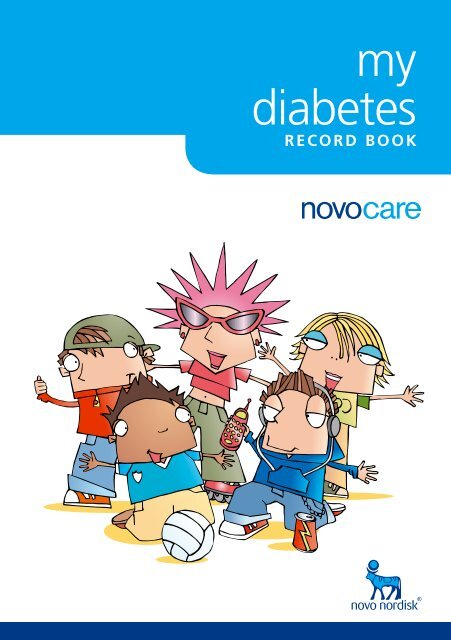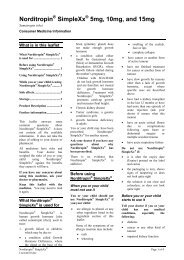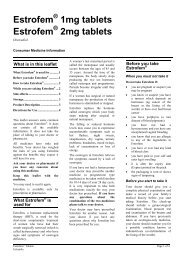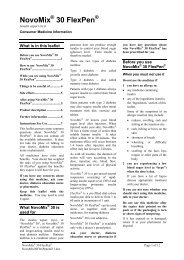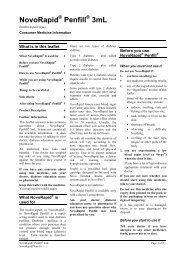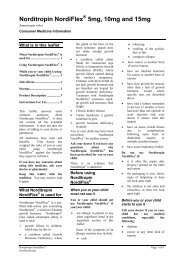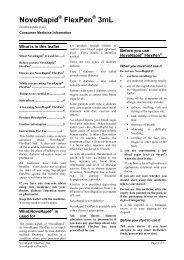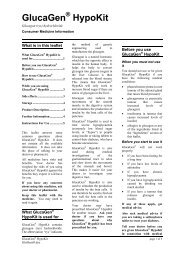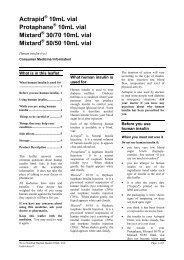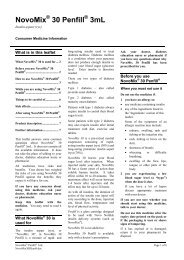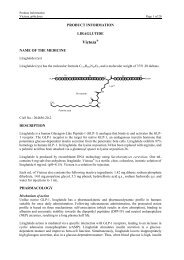Download - Novo Nordisk Australasia
Download - Novo Nordisk Australasia
Download - Novo Nordisk Australasia
Create successful ePaper yourself
Turn your PDF publications into a flip-book with our unique Google optimized e-Paper software.
my<br />
diabetes<br />
gestational type one<br />
D I A B E T E S<br />
R E C O R D B O O K
Your name:<br />
Address:<br />
Phone:<br />
Diabetes Care Team Information:<br />
Name:<br />
Specialty:<br />
Address:<br />
Phone:<br />
Name:<br />
Specialty:<br />
Address:<br />
Phone:<br />
Name:<br />
Specialty:<br />
Address:<br />
Phone:<br />
Special Instructions:
Important information about<br />
managing your diabetes<br />
Here is a list of some things you and your doctor or diabetes care<br />
team can do to help control your diabetes.<br />
1. What your doctor or diabetes care team<br />
needs to do:<br />
3 HbA 1c – a blood test to assess your average blood<br />
sugar control.<br />
3 Lipids – a blood test to check your blood fats.<br />
3 Urine Analysis – a test for early signs of kidney problems.<br />
3 Blood pressure – for signs of general health problems.<br />
3 Foot examination – for signs of ulcers, infections,<br />
abnormalities.<br />
3 Eye examination – to check the back of your eyes for<br />
diabetic changes.<br />
2. What you need to do:<br />
3 See a diabetes educator and dietitian to learn<br />
how to look after your diabetes.<br />
3 Eat sensibly. Eat less sugary and fatty food.<br />
3 Do some regular exercise. Ask your doctor<br />
what exercise is suitable for you.<br />
3 When you visit your doctor remind them<br />
that you have diabetes.
Clinical Data Record<br />
Date<br />
Weight (kg)<br />
Height (m)<br />
BMI (kg/m 2 )<br />
Blood<br />
Pressure:<br />
Lying<br />
Blood<br />
Pressure:<br />
Standing<br />
HbA 1c<br />
Total<br />
Cholesterol<br />
HDL<br />
Cholesterol<br />
LDL<br />
Cholesterol<br />
Triglycerides<br />
Urinary<br />
Protein<br />
Ketones<br />
Please ask your doctor to complete<br />
Date of last eye examination:<br />
Date of last foot examination:<br />
Check of injection sites:
Hypoglycaemia<br />
What is hypoglycaemia?<br />
Hypoglycaemia, or “hypo”, is the term used to describe when<br />
your blood glucose level is
How to deal with “hypos”<br />
There are no absolute guarantees against “hypos”, but there<br />
are a few precautions you can take to help avoid them and the<br />
problems they may cause:<br />
• Be prepared – always carry some quickly absorbed sugary<br />
food with you, e.g. barley sugar, jelly beans, orange juice<br />
or soft drinks (not diet).<br />
• Be sensible about exercise – when performing strenuous<br />
exercise consider having extra carbohydrates to cover the<br />
period of exercise.<br />
• Do not skip or skimp on your meals.<br />
• Occasionally, you may not realise that you are becoming<br />
“hypo”, so if someone tells you that you need sugar, take<br />
it and argue later.<br />
• Carry a diabetes identification card, or wear a Medic Alert ®<br />
bracelet.<br />
• Explain “hypos” and how to treat them to those people you<br />
have close contact with like your family, friends or teacher.<br />
• Finally if you do have a “hypo”, always try and work out<br />
why it happened, so you can try to avoid it next time.<br />
If any of your blood sugar readings are too low or if you have<br />
“hypos” for no obvious reasons at about the same time for<br />
2 days in a row, then you should contact your diabetes care<br />
team as you need to reduce your insulin dose or have your<br />
diet adjusted.
Severe hypoglycaemia<br />
If severe hypoglycaemia does occur, you may lose consciousness.<br />
Food or drinks should not be given to you if you are<br />
unconscious.<br />
In such cases family or friends could give you an injection of<br />
glucagon.<br />
Glucagon will raise your blood sugar by a small amount for a short<br />
while, which is long enough for you to regain consciousness and<br />
take some glucose by mouth. You will normally respond within<br />
10–15 minutes. Medical assistance must be sought for an<br />
unconscious person.<br />
A second injection of glucagon may be given while waiting for<br />
medical assistance. It is a good idea to keep glucagon at home<br />
and perhaps also at school.<br />
If you would like to know more about glucagon, ask your<br />
diabetes care team at your next appointment.
Diabetic Ketosis<br />
Diabetic Ketosis or Ketoacidosis<br />
These words are used by doctors to describe what happens<br />
when the blood sugar level is very high and ketones are present<br />
in the urine. This could be caused by missing insulin injections,<br />
taking too small a dose of insulin or neglecting your diet.<br />
It may also happen if you have an infection or another illness,<br />
because at these times the body needs more insulin. You will<br />
notice that your blood glucose changes to indicate the presence<br />
of more sugar when you have a cold.<br />
It is a serious mistake to think that you need less insulin if you<br />
have an infection. This is not so, even if you lose your appetite.<br />
Remember that if you have an infection you usually need<br />
more insulin, even if you are not eating as much as usual.<br />
Diabetic ketosis is a serious problem which generally develops<br />
gradually over 12 to 48 hours. If you suspect this condition,<br />
immediately seek help from your doctor or diabetes care<br />
team.<br />
Symptoms of Ketosis<br />
The symptoms of ketosis include the following:<br />
• Rapid breathing or breathlessness • Abdominal pain<br />
• Flushed cheeks<br />
• Vomiting, nausea<br />
• Sweet fruity smell on the breath • Extreme drowsiness<br />
• Dehydration<br />
Important<br />
These signs and symptoms should be regarded very seriously and<br />
require immediate medical attention. Remember that you must<br />
never stop your insulin except when instructed to by your doctor.
Weekly Carbohydrate Count<br />
Here you can record the food and grams of carbohydrates (carbs) you eat each day.<br />
WEEK BEGINNING: ___________________________________ ( DATE)<br />
Breakfast Lunch Dinner Snack<br />
Food Serving<br />
Size<br />
Carb(g) Food Serving<br />
Size<br />
Carb(g) Food Serving<br />
Size<br />
Carb(g)<br />
Mon Corn Flakes 30g 30g<br />
Tues<br />
Wed<br />
Thu<br />
Fri<br />
Sat<br />
Sun<br />
Weekly Carbohydrate Count Notes:<br />
Place your<br />
daily sticker<br />
here<br />
SAMPLE ONLY
Weekly Insulin and Blood Glucose Record<br />
Here you can record your insulin injections and blood glucose measurements each day.<br />
WEEK BEGINNING: ___________________________________ ( DATE)<br />
Type of<br />
Insulin<br />
Insulin Injections Monitoring Blood Glucose Remarks<br />
Activity, illness,<br />
Units Given Breakfast Lunch Dinner<br />
Breakfast Lunch Dinner<br />
Before-<br />
Bed Before After Before After Before After<br />
Before<br />
Supper<br />
or Bed<br />
Over<br />
night<br />
diet changes,<br />
time of hypos<br />
(noting blood<br />
glucose<br />
and treatment).<br />
Place your<br />
daily sticker<br />
here<br />
Mon My Insulin 6 4<br />
8.0 8.0 5.0 5.0 1.5<br />
Hypo at 3am ate<br />
Peanut Butter<br />
sandwich (forgot<br />
bedtime snack)<br />
SAMPLE ONLY<br />
Tue<br />
Wed<br />
Thu<br />
Fri<br />
Record the number of Units given in each<br />
injection in the column that corresponds to<br />
the injection time. (Breakfast, Lunch, Dinner,<br />
Before Bed).<br />
• Record Testing Results each time you monitor your glucose.<br />
• Unless your doctor or nurse indicates otherwise, describe times and reasons of any supplemental<br />
insulin doses, changes in eating or activity patterns, illness or other things that may affect your blood glucose.
Weekly Carbohydrate Count<br />
WEEK BEGINNING: ___________________________________ ( DATE)<br />
Breakfast Lunch Dinner Snack<br />
Food Serving<br />
Size<br />
Carb(g) Food Serving<br />
Size<br />
Carb(g) Food Serving<br />
Size<br />
Carb(g)<br />
Mon<br />
Tues<br />
Wed<br />
Thu<br />
Fri<br />
Sat<br />
Sun<br />
Weekly Carbohydrate Count Notes:<br />
Place your<br />
daily sticker<br />
here
Weekly Insulin and Blood Glucose Record<br />
WEEK BEGINNING: ___________________________________ ( DATE)<br />
Type of<br />
Insulin<br />
Insulin Injections Monitoring Blood Glucose Remarks<br />
Activity, illness,<br />
Units Given Breakfast Lunch Dinner<br />
Breakfast Lunch Dinner<br />
Before-<br />
Bed Before After Before After Before After<br />
Before<br />
Supper<br />
or Bed<br />
Over<br />
night<br />
diet changes,<br />
time of hypos<br />
(noting blood<br />
glucose<br />
and treatment).<br />
Mon<br />
Tue<br />
Wed<br />
Thu<br />
Fri<br />
Sat<br />
Sun<br />
Place your<br />
daily sticker<br />
here
Notes
Other Medicines:<br />
Other Medicines:<br />
Family Member:<br />
Other:<br />
Insulin Type:<br />
Tear off here<br />
Family Member:<br />
Other:<br />
Insulin Type:<br />
Doctor:<br />
Doctor:<br />
Emergency Contact Numbers Emergency Contact Numbers<br />
Please fill in<br />
your details<br />
on the attached<br />
cards for<br />
emergency use.<br />
If you are not<br />
sure ask your<br />
Health Care<br />
Professional.<br />
Keep one<br />
of the cards<br />
with you at<br />
all times in case<br />
of an emergency.<br />
Retain the<br />
other one for<br />
safekeeping.<br />
Tear off here<br />
Do not pull<br />
Tear off here<br />
Do not pull
Tear off here<br />
Do not pull<br />
Please fill in<br />
Tear off here<br />
Do not pull<br />
your details<br />
on the attached<br />
cards for<br />
emergency use.<br />
If you are not<br />
sure ask your<br />
Health Care<br />
Professional.<br />
Keep one<br />
of the cards<br />
with you at<br />
all times in<br />
case of an<br />
emergency.<br />
Retain the<br />
other one for<br />
safekeeping.<br />
I HAVE DIABETES I HAVE DIABETES<br />
Name:<br />
Name:<br />
Address:<br />
Tear off here<br />
Address:
g e s t a t i o n a l D I A B E T E S<br />
My diabetes record book, for people<br />
with type 1 diabetes who use<br />
<strong>Novo</strong> <strong>Nordisk</strong> insulin.<br />
This record book has been specifically developed by <strong>Novo</strong><br />
<strong>Nordisk</strong> to help you manage and better understand the<br />
treatment of your diabetes with insulin.<br />
Please see your health care professional for any further<br />
information about your diabetes treatment.<br />
<strong>Novo</strong> <strong>Nordisk</strong> Diabetes Services ®<br />
Provided as a service by<br />
<strong>Novo</strong> <strong>Nordisk</strong> Pharmaceuticals Pty. Ltd.<br />
A.B.N. 40 002 879 996<br />
Level 3, 21 Solent Circuit<br />
Baulkham Hills NSW, 2153 Australia<br />
<strong>Novo</strong>Care Customer Care Centre<br />
1800 668 626<br />
www.novonordisk.com.au<br />
<strong>Novo</strong> <strong>Nordisk</strong> Pharmaceuticals Ltd.<br />
G.S.T. 53 960 898<br />
PO Box 51268, Pakuranga<br />
Auckland, New Zealand<br />
<strong>Novo</strong>Care Customer Care Centre<br />
0800 733 737<br />
www.novonordisk.co.nz<br />
® Registered Trademark of <strong>Novo</strong> <strong>Nordisk</strong> A/S.<br />
Material No: 953405 TAPS Approval No: PP7776<br />
McK29023/09


